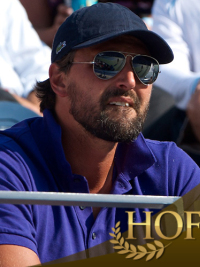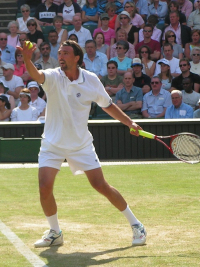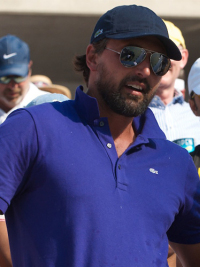Goran Ivanisevic
Full name: Goran Simun Ivanisevic
Nickname: Lanky, Giant
Nickname: Lanky, Giant
| Born |
Subscribe now
This information and data is not available because you are not our subscriber yet.
Please click here and get full access to the entire database! |
|---|---|
| Class of HOF | |
| Height | |
| Weight | |
| Plays | |
| Coach | |
| Bio | Goran is a retired Croatian professional tennis player. He is the only player to win the men's singles title at Wimbledon as a wildcard. He achieved this in 2001, having previously been runner-up at the championships in 1992, 1994 and 1998. His career-high singles ranking was World No. 2 (behind Pete Sampras) in 1994. Ivanišević's career-high singles ranking was world No. 2, achieved in July 1994. He coached Marin Čilić from September 2013 to July 2016, leading Čilić to his only major title to date at the 2014 US Open. He has been coaching Novak Djokovic since 2019. Ivanišević was inducted into the International Tennis Hall of Fame in 2020. Goran is the son of Srđan and Gorana (née Škaričić). He turned professional in 1988 and later that year, with Rüdiger Haas, won his first career doubles title in Frankfurt, but he focused more on his singles career, yet had some success in doubles, winning nine titles and reaching a career high ranking of 20. In 1989, as a qualifier he made the quarter finals of the Australian Open. Ivanišević made his first significant impact on the tour in 1990, knocking Boris Becker out of the first round of the French Open men's singles; he went on to reach the quarter-finals. He was also, with Petr Korda, the runner-up in the French Open men's doubles. At that year's Wimbledon, Ivanišević reached the semi-finals, where he lost to Becker in four sets. Ivanišević also won his first tour singles title in 1990 at Stuttgart and helped Yugoslavia win the World Team Cup. He played in eight ties for Yugoslavia in the Davis Cup before quitting the team after the Croatian declaration of independence in 1991. Yugoslavia lost its subsequent tie against France 5–0. Ivanišević quickly became known on the tour for his strong, attacking style of play and for an extremely powerful serve. For several years, he had more aces than anyone else on the tour. Capable of beating anyone in the world when at his very best, he was also known for occasional on-court temper tantrums—usually directed towards himself—and the volatility of the standard of his play. Ivanišević received death threats at the 1992 Australian Men's Hardcourt Championships. He went on to win the tournament. In 1992, Ivanišević steamrolled his way to reach his first Wimbledon singles final, having defeated Ivan Lendl, Stefan Edberg, and Pete Sampras in succession. Ivanišević's 6–7, 7–6, 6–4, 6–2 semifinal victory over Sampras was particularly impressive, with Ivanišević serving 36 aces and not even facing a break point in the entire match. In the final, Ivanišević faced Andre Agassi and was heavily favored to win; with both players attempting to win their first Grand Slam title. Agassi eventually won 6–7, 6–4, 6–4, 1–6, 6–4. In the fifth set, Ivanišević had a breakpoint on Agassi's serve at 3–3, but failed to convert it. In the final game of the match, Ivanišević served 2 double faults to start the game, even though he had only served 5 double faults in the entire match before that. Ivanišević's ace count for the tournament (206) was the highest in Wimbledon history at the time, until Ivanišević beat his own record in 2001 with 213 aces. Ivanišević served 37 aces in the 1992 Wimbledon final against Agassi, while Agassi had 37 aces in the entire tournament. Later that summer at the Olympic Games in Barcelona, Ivanišević won bronze medals in both singles and doubles representing Croatia, a state that had only recently declared independence; he also served as flagbearer for the Croatian team at the opening ceremony. In order to earn his single bronze medal, he won four consecutive 5-sets matches, a unique feat in the open era. He also won four singles titles that year. Ivanišević reached the Wimbledon final for the second time in 1994, where he was defeated by defending-champion Pete Sampras 7–6, 7–6, 6–0. Ivanišević reached his career-high singles ranking of World No. 2 in July that year. In 1995, Ivanišević won the Grand Slam Cup, beating Todd Martin in the final 7–6, 6–3, 6–4. At Wimbledon, Ivanišević again lost in the semifinals to Sampras 6–7, 6–4, 3–6, 6–4, 3–6. In 1996 he won a career-best five singles titles. He reached the Grand Slam Cup final again, but this time lost to Becker in straight sets. Ivanišević also teamed with Iva Majoli to win the 1996 Hopman Cup for Croatia. That year Ivanišević also defeated Stefan Edberg to reach the semi-finals of the U.S. Open, his first Grand Slam semi-final away from Wimbledon; the match was the last Grand Slam match of Edberg's career. In the semifinals, Ivanišević fell again to Sampras, in four sets; Sampras would go on to defeat Michael Chang to win his fourth U.S. Open championship. In April 1997, Ivanišević became the only player to defeat the "king of clay", Thomas Muster, in a Davis Cup singles match on clay. Ivanišević defeated Muster, 6–7, 7–5, 6–7, 6–2, 7–5, despite Muster having won 112 of his previous 117 matches on clay going into the match. During 1997, Ivanišević also got back up to his career high ranking of world No. 2, although his ranking fell down to No. 15 by the end of the year. In 1998, Ivanišević reached his third Wimbledon final, facing Sampras once again. Although a heavy underdog, this time he pushed Sampras to five sets, before losing. Ivanišević started the match well, but failed to take set points which would have given him a two-set lead, and Ivanišević eventually lost to Sampras in five sets, 7–6, 6–7, 4–6, 6–3, 2–6. Ivanišević finished runner-up in the French Open men's doubles in 1999 (with Jeff Tarango). However for much of 1999, 2000, and 2001, he struggled with a shoulder injury and his performance and world ranking began to slide steadily. During his second round match at the 2000 Brighton International, Ivanišević was defaulted after he smashed all three of his rackets and had none available to complete the match. He told the Associated Press, "At least when I've finished playing tennis, they'll remember me for something...They'll say, 'There's that guy who never won Wimbledon, but he smashed all his rackets.'" By the summer of 2001, Ivanišević was ranked the World No. 125. This was not sufficient to earn him an automatic place in the main draw at Wimbledon but, given his past record as a three-time runner-up, he was awarded a wildcard for entry into the singles draw. He defeated former and future World #1 players Carlos Moyá, Andy Roddick and Marat Safin as well as Fredrik Jonsson and Greg Rusedski to reach the semi-final, beating home favourite Tim Henman in a five set, rain-affected semi-final, setting-up a match with the previous year's runner-up and former US Open champion Patrick Rafter. It was Ivanišević's first singles final since 1998. In a match lasting just over three hours, Ivanišević defeated Rafter 6–3, 3–6, 6–3, 2–6, 9–7. Two months shy of his 30th birthday, Ivanišević became the lowest-ranked player and the first wildcard entry to win Wimbledon. To date, he is the only male entrant to have won a Grand Slam as a wildcard. His Wimbledon success was rated sixteenth at the list of 100 Greatest Sporting Moments by a British television programme. On July 10, 2001, Ivanišević received a hero's welcome in his home city of Split where a crowd of over 150,000 led by local and state dignitaries greeted him at the central harbor, with a parade of boats as well as fireworks, topped off by Ivanišević himself taking off his clothes and jumping into the sea. Later that year he received the BBC Sports Personality of the Year Overseas Personality Award. The 2001 Wimbledon title was the last of Ivanišević's career. He temporarily retired in 2002 due to shoulder surgery. He returned to tennis sparingly in the following years but in 2004 retired after a third-round loss to Lleyton Hewitt at Wimbledon, held on the Centre Court, the scene of his greatest triumph. Right after retiring from the ATP Tour in 2004, Ivanišević started playing on the ATP Champions Tour (seniors' circuit). In August 2005 Ivanišević got voted to be one of four vice-presidents of the Croatian Olympic Committee (HOO) working under president Zlatko Mateša. In 2005, he was a member of the Croatian team for the Davis Cup final against Slovakia in Bratislava, although he did not play. Croatia won the final 3–2. Ivanišević received a winner's medal and his name was engraved on the trophy along with Mario Ančić, Ivo Karlović, Ivan Ljubičić and team captain Nikola Pilić. In June 2006, he performed in the Calderstones Park tournament in Liverpool. In November of the same year, Ivanišević won the Merrill Lynch Tour of Champions tournament in Frankfurt, defeating John McEnroe 7–6(12), 7–6(1). In 2007, Roger Federer, seeking his 5th consecutive Wimbledon title against Rafael Nadal in the final, practiced with Ivanišević. Federer said the practice session helped him against Nadal. In 2013 Ivanišević began coaching compatriot Marin Čilić who won the 2014 US Open under his guidance. He split with Čilić after 2016 Wimbledon. On August 8, 2016, Tomáš Berdych announced via social media that Ivanišević will begin coaching him, starting at 2016 Western & Southern Open. As of 2019, he was coaching Milos Raonic until just before the Indian Wells Masters, when Raonic announced that he would be getting a new coach Fabrice Santoro. On 30 June 2019, Novak Djokovic confirmed that he had added Ivanišević to his coaching team. On July 17, Ivanišević faced Rafter once again in an exhibition match on 2019 Croatia Open Umag. The match was held to celebrate 18th "birthday" of the famous 2001 Wimbledon final in which Ivanišević won. Ivanišević won once again 6–4, 6–4. The Croatian Open Centre Court has also been renamed in Ivanišević's honour. Ivanisevic was a serve and volleyer and played a fast, aggressive game suited to grass courts. He was known for his powerful and accurate left-handed serve, particularly his first serve that was clutch, and is widely considered one of the most dominant servers in the history of tennis. He often won entire games without the ball being returned. Like many serve-and-volleyers, Ivanisevic's return game and defence was weaker due to his powerful but inconsistent groundstrokes. On the backhand side, he would often use the slice instead of hitting with top-spin and use the chip-and-charge tactic to come to the net. |
| Misc | Subscribe now |
| Tournament | AO | RG | W | US | Win-Loss |
|---|---|---|---|---|---|
|
Subscribe now
This information and data is not available because you are not our subscriber yet.
Please click here and get full access to the entire database! |
|||||


